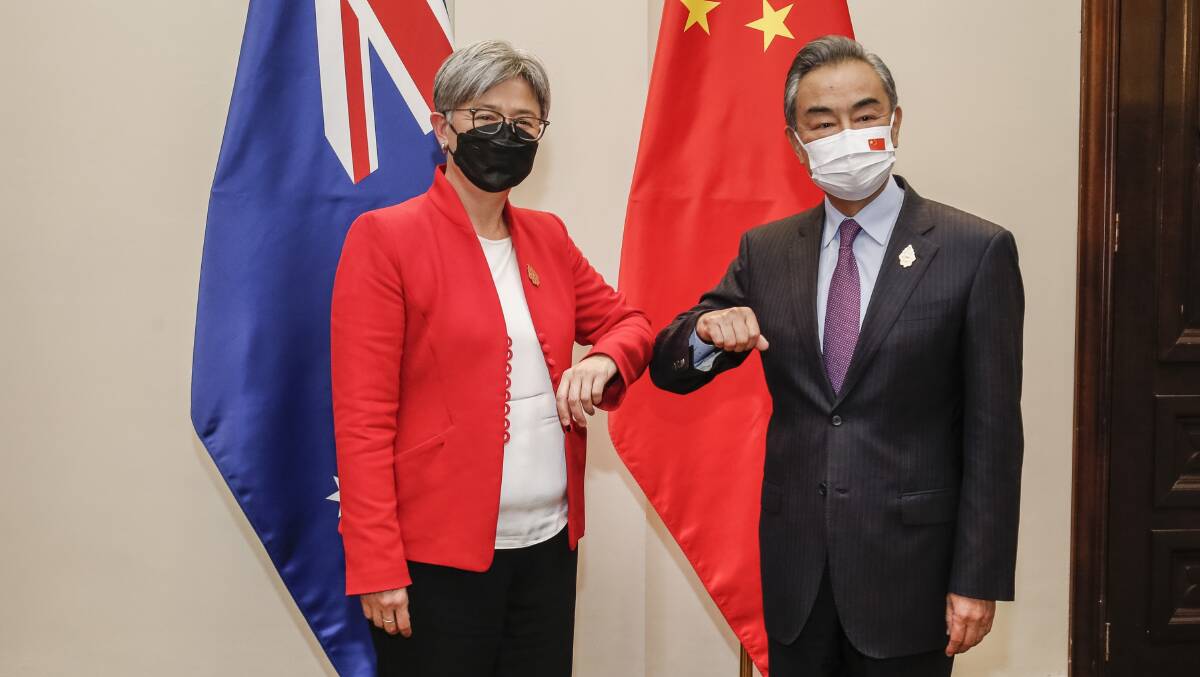
We're really just going through the motions.
China has reacted to the election of our new government by suggesting improved relations. Of course it wants to see whether Labor will take a soft attitude in return for some reward, such as improved trade access.
The government has been duty-bound to respond. Quite rightly, it has earnestly taken opportunities for ministerial meetings - yet it obviously realises that this will go just about nowhere.
Interestingly, China is also trying to go over the head of the government by crafting its message to appeal to some of our voters. It's a message that should work on some parts of the media, too.
Relations between the two countries went downhill after the Coalition took office. That was just as China was becoming more internationally assertive (as we used to say) or aggressive (as we increasingly say), and Australia reacted.
Canberra's call in April 2020 for an inquiry into the origins of COVID-19 was the last straw for Beijing. Chinese people would be humiliated, and dissatisfied with the Chinese Communist Party, if they thought the global catastrophe had begun in their country. (They've been thoroughly brainwashed to think it didn't.)
So China blocked many of our exports and rejected ministerial-level discussions.
Almost as soon as Labor was elected, Defence Minister Richard Marles got a meeting with his Chinese counterpart, General Wei Fenghe. And Foreign Affairs Minister Penny Wong met the Chinese foreign minister Wang Yi on July 8.
But the government clearly knows that China won't change its behaviour. Eight weeks after the election, there is not the slightest indication that Labor is taking a soft line.
The government is right to talk, to see whether relations can be improved without making major concessions. But China has clearly settled into a condition of enduring hostility with democracies. We're in Cold War II.
Wang told Australia what it should do to improve relations. Most of what he said sounded like waffle, but in fact there were substantial messages in there.
For one thing, said the minister, Australia should regard China as a partner, not a rival. Interpretation: we should let China do as it pleases and pretend that it's not a growing military threat to us.
Next, the two countries should get along by seeking common ground and reserving differences, he said. He meant we should not say anything publicly that displeased China - for example about its oppression in Xinjiang, Tibet and Hong Kong.
In other words, Australia should adopt the supine attitude of New Zealand.
Wang also urged "building positive and pragmatic social foundations and public support" - that is, saying nice things about China to the Australian people.
There's also a hint in that about controlling the Australia media. As ridiculous as it may seem, Chinese diplomats somehow imagine that Western governments can and will direct media what to say.
This doesn't give us much confidence in China's ability to understand the world beyond Planet CCP.
Wang's fourth point was clearest: there should be no targeting of any third party or being controlled by any third party. That meant Australia should leave Russia alone and - Beijing's highest aim for our policy - abandon the US in resisting China's attempt to dominate this side of the world.
Australian media mostly presented these points as "demands", which sounded aggressive, but it would be just as reasonable to call them "requests", however outlandish they might have been.
Anthony Albanese picked up "demands" and ran with it. "Australia doesn't respond to demands," he said. "We respond to our own national interests."
OK, Mr Albanese. We get the message: you're strong on China. Now let's tone down the performative tough language.
Wang even played a bit of music to Labor's ears. "The root cause of the difficulties in Chinese and Australian relations in recent years lies in the insistence of previous Australian governments to treat China as an opponent and even a threat," he said.
He meant that the Coalition was a bunch of bad guys, and Labor could now be good guys.
In fact, that message will resonate more with rusted-on Labor and Greens supporters than with wised-up Labor ministers who have access to worrying intelligence reports.
MORE AGE OF THE DRAGON:
Disliking the other side of politics, many strong Labor and Greens supporters may feel some sympathy for China as a victim of "the shocking Tories". At least these voters will have some expectation that Labor should do better on relations with China.
Left-wing media and commentators may incline the same way.
That will please Beijing.
Wang's point about Australia rejecting control by the US is aimed directly at this country's pro-China element.
Scratch the surface of many of China's supporters in Australia and you'll find people who detest the US. From my experience, the anti-Americanism came to them first, then they saw the US in some kind of contest with China, so, to them, China had to be right.
Many end up repeating the CCP's propaganda talking points, though only a few debase themselves by defending its domestic oppression, such as sending more than 1 million Uighurs to brainwashing detention camps.
For anyone who dislikes the US, it's natural to tell everyone who will listen that the real problem with China is an attempt by Washington to weaken it, that the rivalry is none of our business and that we shouldn't be part of it - and, above all, that we shouldn't be controlled by the US.
Again, there's no shortage of anti-American sentiment in some parts of the media. For China, this is a resource that's well worth exploiting.


